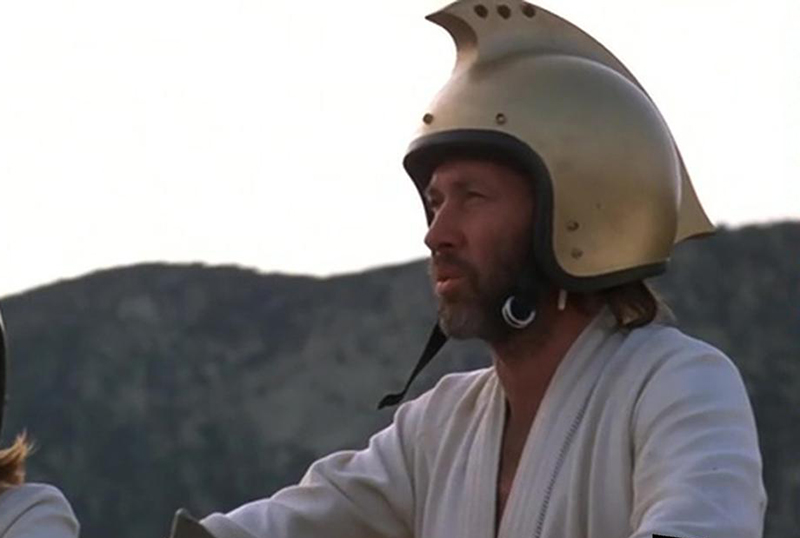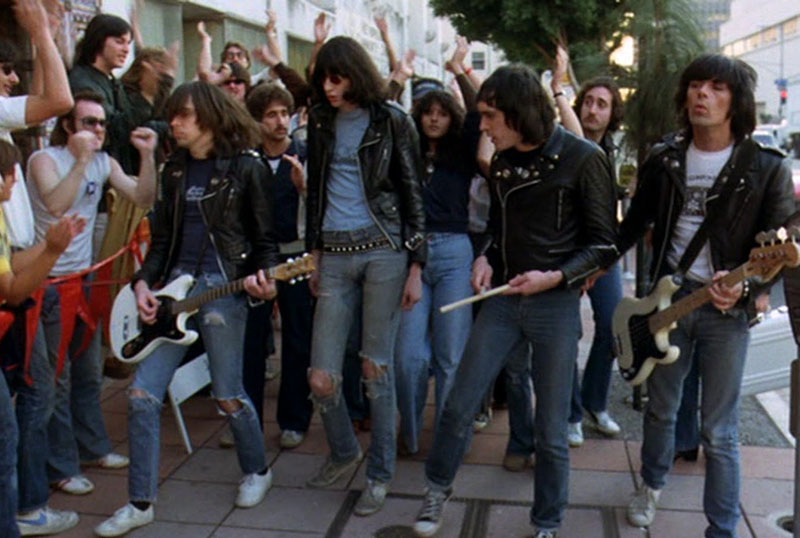In time for the release of the limited edition steelbook release of Rock ‘n’ Roll High School from Shout! Factory, ComingSoon.net got the opportunity to catch up with director Allan Arkush of the cult musical comedy to discuss its legacy in the 40 years since its release and the special new edition of the film.
Purchase your copy of the Rock ‘n’ Roll High School steelbook here!
“I have to hand it to them, they always do an excellent job on every movie,” Arkush said of Shout! Factory, who issued the new Blu-ray. “I’ve done a bunch of my New World titles with Shout! Factory. The guy who started it originally started with vinyl records, so I go way back with them. I always feel my material is in great hands because they are outlaws, they don’t let the lawyers rule. So every bit of behind the scenes photos, without everyone being cleared in the photo, everything is in there. The new documentary is really interesting, it’s a new hour and ten minute documentary about the film that kind of fills in the really early genesis of it with photos and stuff and how I became interested in music and movies.”
RELATED: Shout! Factory Purchases the Roger Corman Film Library
The film, which was distributed by Roger Corman through New World Pictures, almost took a different musical path when the legendary producer originally wanted disco to be the main thematic hook, despite the theme of anarchy and the genre not meshing together.
“That was the second incarnation of it, the first was what got it going in the first place and it kind of seemed time for me to make a movie because I had co-directed it and directed second unit,” Arkush said referring to the Corman-produced Hollywood Boulevard. “I wanted to make a high school musical, but Roger kind of said, ‘Well I want to do a high school movie.” He had one called ‘Girl’s Gym,’ it had naked gymnastics in it, which made it really hard to cast. But I had all these notes and outlines and stuff from all these rock and roll high school ideas I had, so Joe Dante and I dictated them to a stenographer who printed them up. Then Joe McBride was brought in to write ‘Girls’ Gym,’ and wrote the first couple of drafts, and in those drafts the Riff Randell character was in there, but different, and he was the one who came up with the students going on strike and blowing up the high school. We still had to have the naked gymnastics, but I think one of the students wanted to have her own band and the band appeared. At first, I didn’t really get blowing up the high school, but Joe was right, he talked me into it and that’s what we presented to Roger and he was enthusiastic.”

Before he could go on to make the film, however, Corman requested Arkush’s help with another film that was struggling: the 1978 sci-fi B-movie Deathsport, which was having issues with its director Nicholas Niciphor and star David Carradine (Kill Bill). He and Corman worked together to save the film, which Arkush refers to as “terrible,” but it was during this time that the musical genre saw a revival with Grease and Saturday Night Live hitting big at the box office and with critics.
Corman saw this as the perfect time to bring the film, which he envisioned as ‘Disco High,’ to life, but in looking at the project Arkush realized they wanted to do something more comedic with the material and found writers in Russ Dvonch and Richard Whitley, who portrayed mutants on Deathsport.
“It was in that development that it was clear to us it was never going to be ‘Disco High,'” Arkush said. “Once we got it really far along, we had talked to the groups and we were pretty much ready to make a big move to approach the group. I had to have a meeting with Roger and explain the difference between disco and rock music and I did a scene that maybe changed my career. I stood up on his couch and I demonstrated Pete Townsend smashing a guitar and said, ‘That’s what we’re looking for, that’s the energy of the rock music. You’ve got to be able to smash your instruments to blow up a high school.'”

One of the big draws for the film when it came to selling it to both audiences and producers was the inclusion of pop rock band The Ramones portraying themselves in a story with them as the focus and Arkush said getting them in front of the camera was a breeze “once they learned to trust me.”
“I went to New York and saw them play and I had been a big fan,” Arkush said. “‘At that point, ‘Rocket to Russia’ was one of the greatest rock albums ever made, which was why I wanted that band. They were funny and rocked really hard, so in New York I met them and got to meet Lester Bangs and The Talking Heads and hang out at CBGB’s with them and that’s where a lot of the character stuff came in because of their fascination with pizza and all that. We tried to have a rehearsal in LA and that wasn’t going to work so I just went over lines and they changed some, then we had a screening at my apartment. I had a 16-millimeter projector of A Hard Day’s Night because that’s my favorite rock movie, that’s the movie that changed my life. They loved that movie and I wanted to talk about projecting a group on camera and lip sync and all of that.”
Though Arkush and The Ramones connected over their love of The Beatles film in the director’s apartment, it was his record collection, which Arkush says is “huge,” that almost put a hitch into their working relationship early on.
“They start looking through my records to see what I have and Johnny all of a sudden says ‘What the fuck is this?'” Arkush recalls. “He pulls out this section of Grateful Dead records and goes, ‘You like this hippie shit or what?’ I said, ‘I love the Grateful Dead,’ and he says, ‘How can you like the Grateful Dead and us?’ That was a very big point, you know? They all turned to me and I said, ‘You’re both auteurs, you both take any music that you play and contextualize it and make it your own. If you guys decided to play trumpet, it would be two minutes and five seconds long and it would sound like it was never played by the Grateful Dead. If they decided to play ‘I Wanna Be Sedated,’ it would be 20 minutes long and it would sound like them. That purity of expression is why I can love you and love them.’ We kind of came to an understanding then and I remained friends with them after the film. I was a close friend of Joey’s until he passed away, I celebrated every birthday with him and we talked on the phone often. He covered a Louis Armstrong song, ‘It’s a Wonderful World,’ and he had never heard any other of his songs, so I made him a mixtape of Louis Armstrong. He used to give me music to listen to, although I have to say I like AC/DC, I like Metallica, but Kiss never worked.”
RELATED: CS Interview: Michael Lehmann & Daniel Waters on Heathers’ 30th B-Day
Despite the positive reviews upon its release, it took a while for the film to start finding success with audiences, with Arkush recalling it “died in the drivers and stuff in Texas, Arizona, etc.” and that it “gradually caught on when it was double billed in Chicago,” although by then it “was on its last legs and we were just hanging on by our fingernails.” Arkush credits the success to the distributor who began pairing the musical comedy with other films, saying he “could tell I’m talking to a film buff,” and that it was paired with Grease across 50 theaters and Dawn of the Dead in the other 50.
“The audience loved it, Siskel and Ebert gave it a great review and said it should play at midnight,” Arkush said. “It started growing at midnight everywhere, but after all these years, two things have emerged about the movie that are undeniable why it’s still popular. One is The Ramones became more mainstream because people started to understand what they were doing. When we made the movie, they were as edgy as any band in the world, with Sex Pistols and everything. They couldn’t get air play or anything, but now, people love The Ramones and their music. They sound to me always like The Beach Boys or The Ronettes, if they were backed by chainsaws. So that music has become timeless, but even more than that, the character of Riff Randell is what keeps this movie alive. I would say 70 percent of the people who approached me about the movie are women of all ages, and they all tell me about how Riff Randell empowered them when they first saw the movie, and that they realized that they can be rock fans, too. That they cannot take shit from their school and they can dress how they wanted and do what they needed to do. That their needs and desires are the most important thing, and I’m really, really proud of that.”










